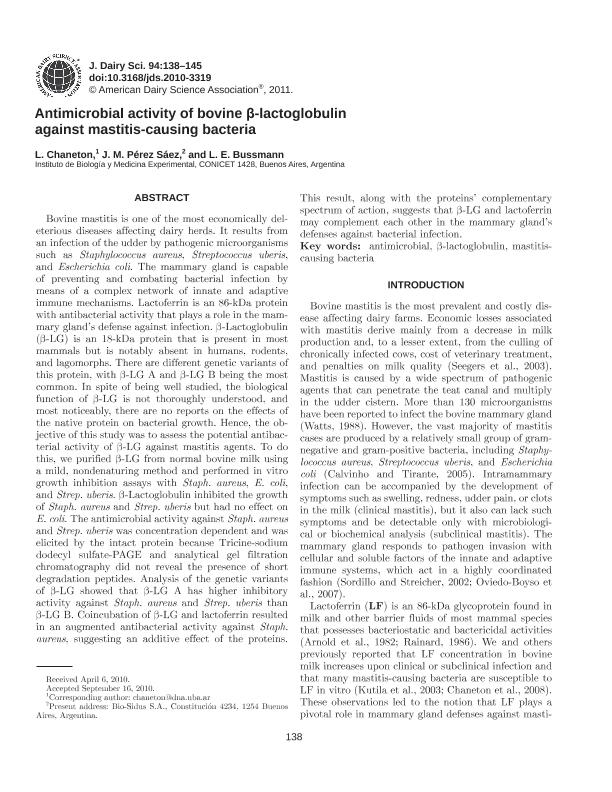Artículo
Antimicrobial activity of bovine β-lactoglobulin against mastitis-causing bacteria
Fecha de publicación:
01/2011
Editorial:
American Dairy Science Association
Revista:
Journal of Dairy Science
ISSN:
0022-0302
Idioma:
Inglés
Tipo de recurso:
Artículo publicado
Clasificación temática:
Resumen
Bovine mastitis is one of the most economically deleterious diseases affecting dairy herds and results from an infection of the udder by pathogenic microorganisms such as Staphylococcus aureus, Streptococcus uberis, and Escherichia coli. The mammary gland is capable of preventing and combating bacterial infection by means of a complex network of innate and adaptive immune mechanisms. Lactoferrin is an 86-kDa protein with antibacterial activity that plays a role in the mammary gland's defense against infection. β-Lactoglobulin (β-LG) is an 18-kDa protein that is present in most mammals but is notably absent in humans, rodents, and lagomorphs. Different genetic variants of this protein exist, with β-LG A and β-LG B being the most common. In spite of being well studied, the biological function of β-LG is not thoroughly understood, and most noticeably, no reports exist on the effects of the native protein on bacterial growth. Hence, the objective of this study was to assess the potential antibacterial activity of β-LG against mastitis agents. To do this, we purified β-LG from normal bovine milk using a mild, nondenaturing method and performed in vitro growth inhibition assays with Staph. aureus, E. coli, and Strep. uberis. β-Lactoglobulin inhibited the growth of Staph. aureus and Strep. uberis but had no effect on E. coli. The antimicrobial activity against Staph. aureus and Strep. uberis was concentration dependent and was elicited by the intact protein because Tricine-sodium dodecyl sulfate-PAGE and analytical gel filtration chromatography did not reveal the presence of short degradation peptides. Analysis of the genetic variants of β-LG showed that β-LG A has higher inhibitory activity against Staph. aureus and Strep. uberis than β-LG B. Coincubation of β-LG and lactoferrin resulted in an augmented antibacterial activity against Staph. aureus, suggesting an additive effect of the proteins. This result, along with the proteins' complementary spectrum of action, suggests that β-LG and lactoferrin may complement each other in the mammary gland's defenses against bacterial infection. © 2011 American Dairy Science Association.
Palabras clave:
Β-Lactoglobulin
,
Antimicrobial
,
Mastitis-Causing Bacteria
Archivos asociados
Licencia
Identificadores
Colecciones
Articulos(IBYME)
Articulos de INST.DE BIOLOGIA Y MEDICINA EXPERIMENTAL (I)
Articulos de INST.DE BIOLOGIA Y MEDICINA EXPERIMENTAL (I)
Citación
Chaneton, Luciano; Pérez Sáez, Juan Manuel; Bussmann, Leonardo Edmundo; Antimicrobial activity of bovine β-lactoglobulin against mastitis-causing bacteria; American Dairy Science Association; Journal of Dairy Science; 94; 1; 1-2011; 138-145
Compartir
Altmétricas




